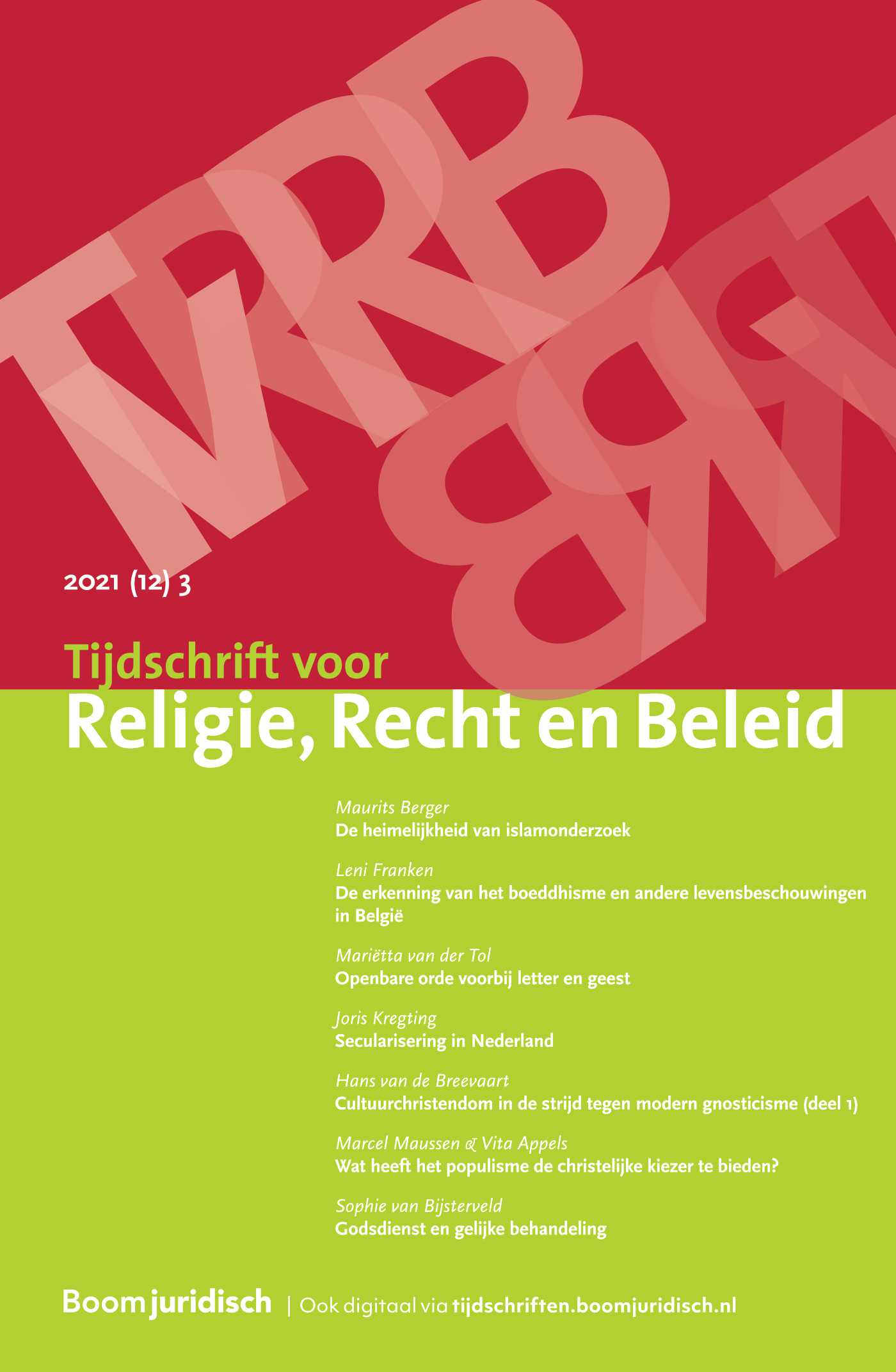|
This editorial offers an introduction to the current issue. |


Tijdschrift voor Religie, Recht en Beleid
Meer op het gebied van Algemeen
Over dit tijdschriftMeld u zich hier aan voor de attendering op dit tijdschrift zodat u direct een mail ontvangt als er een nieuw digitaal nummer is verschenen en u de artikelen online kunt lezen.
| Redactioneel |
|
| Trefwoorden | editorial, ritual slaughtering |
| Auteurs | Carla Zoethout |
| SamenvattingAuteursinformatie |
| Artikel |
|
| Trefwoorden | corporal punishment, Suriname, parenting |
| Auteurs | Monique Veira en Duncan Wielzen |
| SamenvattingAuteursinformatie |
|
One educational mean in parenting is corporal punishment. In Suriname it is still customary and accepted that parents use this as an educational tool. Although Surinamese society is structured differently and thinks differently about the use of corporal punishment than Dutch society does, Dutch rules in this regard have been copied into the draft Surinamese Civil Code. This article gives an overview of the sources of Surinamese law on the issue and the main arguments from the debate about whether or not corporal punishment should legally become a form of abuse. It also considers religiously and biblically inspired motives for applying corporal punishment in parenting. The authors argue that legislation on corporal punishment may not necessarily be at odds with public opinion. That may depend on the impact of religious and biblical sources on personal convictions regarding the upbringing of children. The authors also advocate in favor of a loving upbringing of children by their parents. They claim that legislation can promote such an objective, or at least serve as a deterrent to child abuse through corporal punishment on a symbolic level. |
| Artikel |
|
| Trefwoorden | primary education, religious movements |
| Auteurs | Marietje Beemsterboer |
| SamenvattingAuteursinformatie |
|
Since the introduction of the Primary Education Act in 1985, all Dutch primary schools are obliged to teach religious movements as a subject, to make children aware that they are growing up in a multicultural society. Although many schools endorse the idea of education in spiritual movements, recent study shows that currently only 14% of the Dutch primary schools teach all religious movements without focusing on one tradition. This article discuss what the legislator had in mind with the obligation to educate religious movements, what it became in practice and the opportunities schools see for education in religious movements. |
| Artikel |
|
| Trefwoorden | popular sovereignty, theocracy, christian political parties |
| Auteurs | Emo Bos |
| SamenvattingAuteursinformatie |
|
Calvinist politicians have traditionally rejected the principle of people’s sovereignty as contrary to God’s sovereignty. However, over time, the majority of these politicians have used the term democracy, which basically means the same, although there has always been a minority seeking a theocracy or a Christian government. Nowadays, Christian politics will not pursue a Christian state, but it pleads for the right to religious liberty in which it finds the key to thinking about human rights and the rule of law. |
| Artikel |
|
| Trefwoorden | Principle of equality, discrimination, autonomy, constitutional rights, neutrality |
| Auteurs | Henk Post |
| SamenvattingAuteursinformatie |
|
A fundamental principle of a just society is autonomy of societal or communal spheres. This principle contributes to a society in which people develop their own lifestyles according to their own personal convictions. The author argues that such plurality of society will be disrupted if the principle of equality becomes the dominant principle thereby undermining the sovereignty of the communal spheres. |
| Artikel |
|
| Trefwoorden | Islam, female circumcision, terrorism, academic research |
| Auteurs | Marnix Croes |
| SamenvattingAuteursinformatie |
|
If one listens to what the authorities say about matters such as female circumcision and terrorism, Islam has nothing to do with it. These authorities are supported in this opinion by the work of many scientists. A cross section of the Dutch scientific literature on female circumcision and terrorism is discussed here. The upshot is that, regarding female circumcision, the literature is plagued with factual inaccuracies while the question of Islamic terrorism is dealt with in a one-sided and over-simplified way. The article concludes with an alternative research agenda that would help fill the gaps in our knowledge about the role of Islam in the behaviour of Islamic terrorists. |
| Jurisprudentie |
|
| Trefwoorden | case law, Turkey, freedom of religion |
| Auteurs | Maurits Berger |
| SamenvattingAuteursinformatie |
|
Dispute about wearing hats and wearing religious clothes |

 Aflevering 3
Aflevering 3